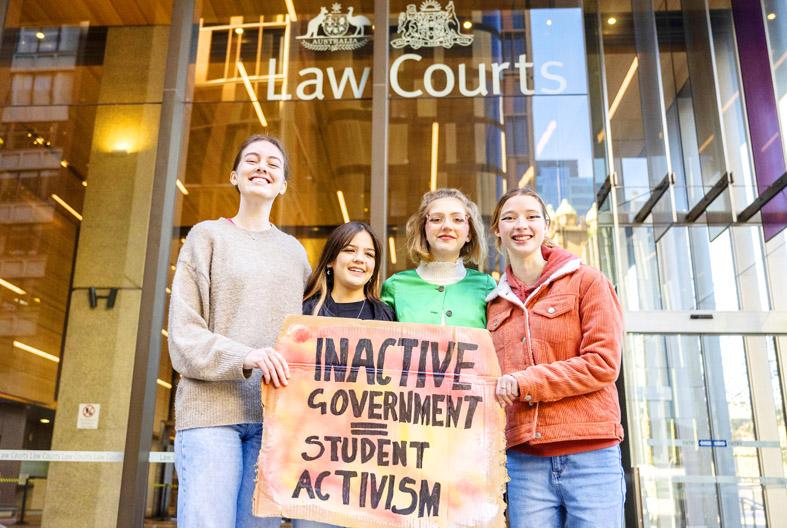An Australian court yesterday threw out a landmark legal ruling that the nation’s environment minister had a duty to protect children from climate change.
Last year’s legal win by a group of high-school students had been hailed by environmental groups as a potential legal weapon to fight fossil fuel projects, but the federal court found in favor of an appeal by Australian Minister for the Environment Sussan Ley, deciding she did not have to weigh the harm climate change would inflict on children when assessing the approval of new fossil fuel projects.
The judgement overturned a ruling in July last year by a lower court that found the minister had a duty to “avoid causing personal injury or death” to under 18s due to “emissions of carbon dioxide into the Earth’s atmosphere.”

Photo: AP
Anjali Sharma, 17, who launched the legal action in 2020, said the minister’s successful appeal had left the students “devastated.”
“Two years ago, Australia was on fire; today, it’s under water. Burning coal makes bushfires and floods more catastrophic and more deadly. Something needs to change,” Sharma said.
Izzy Raj-Seppings, 15, said the court had accepted that young people would “bear the brunt of the impacts of the climate crisis,” which she described as an important step in climate litigation.
However, the federal court found emissions from the mine at the center of the case — Whitehaven’s Vickery coal mine — posed only a “tiny increase in risk” to the students.
Ley welcomed the verdict.
“The minister always takes her role as the environment minister seriously,” a spokesperson said in a statement.
Lawyer George Newhouse of Macquarie University said that the Sharma decision reflected Australia’s lack of a bill of rights.
“We don’t have the scope for the successful climate change litigation that we see in Europe because Australia has a constitution that, quite intentionally, contains no human rights,” Newhouse said.
He said landmark cases, such as the Urgenda precedent — in which Dutch citizens successfully sued their government to take climate action — would fail in Australia because of this.
“I am disappointed by the Sharma decision, but not surprised,” he said.
Sharma and her fellow students are considering whether to appeal to Australia’s highest court.
Climate and environmental law expert Laura Schuijers from the University of Sydney said the High Court might well elect to hear their appeal, given the importance of the questions raised.
Schuijers said Australia’s lack of a constitutional protection of human rights made it “a very interesting place for climate litigation.”
“It means that litigants are seeking creative ways to test the bounds of the law and to ask the ultimate question: In the face of inaction, who is responsible for picking up the slack?” she said.
The ruling had “put the spotlight on Australia’s politicians and policymakers to take the proactive action that the science presented in the courtroom suggests is urgently needed,” she added.
Australia has been at the sharp end of climate change, with droughts, deadly bushfires, bleaching events on the Great Barrier Reef and floods becoming more common and intense as global weather patterns change.

Shamans in Peru on Monday gathered for an annual New Year’s ritual where they made predictions for the year to come, including illness for US President Donald Trump and the downfall of Venezuelan President Nicolas Maduro. “The United States should prepare itself because Donald Trump will fall seriously ill,” Juan de Dios Garcia proclaimed as he gathered with other shamans on a beach in southern Lima, dressed in traditional Andean ponchos and headdresses, and sprinkling flowers on the sand. The shamans carried large posters of world leaders, over which they crossed swords and burned incense, some of which they stomped on. In this

Indonesia yesterday began enforcing its newly ratified penal code, replacing a Dutch-era criminal law that had governed the country for more than 80 years and marking a major shift in its legal landscape. Since proclaiming independence in 1945, the Southeast Asian country had continued to operate under a colonial framework widely criticized as outdated and misaligned with Indonesia’s social values. Efforts to revise the code stalled for decades as lawmakers debated how to balance human rights, religious norms and local traditions in the world’s most populous Muslim-majority nation. The 345-page Indonesian Penal Code, known as the KUHP, was passed in 2022. It

Near the entrance to the Panama Canal, a monument to China’s contributions to the interoceanic waterway was torn down on Saturday night by order of local authorities. The move comes as US President Donald Trump has made threats in the past few months to retake control of the canal, claiming Beijing has too much influence in its operations. In a surprising move that has been criticized by leaders in Panama and China, the mayor’s office of the locality of Arraijan ordered the demolition of the monument built in 2004 to symbolize friendship between the countries. The mayor’s office said in

‘TRUMP’S LONG GAME’: Minnesota Governor Tim Walz said that while fraud was a serious issue, the US president was politicizing it to defund programs for Minnesotans US President Donald Trump’s administration on Tuesday said it was auditing immigration cases involving US citizens of Somalian origin to detect fraud that could lead to denaturalization, or revocation of citizenship, while also announcing a freeze of childcare funds to Minnesota and demanding an audit of some daycare centers. “Under US law, if an individual procures citizenship on a fraudulent basis, that is grounds for denaturalization,” US Department of Homeland Security Assistant Secretary Tricia McLaughlin said in a statement. Denaturalization cases are rare and can take years. About 11 cases were pursued per year between 1990 and 2017, the Immigrant Legal Resource